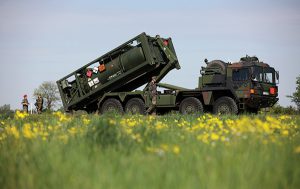Bloomberg
Chancellor Olaf Scholz announced that Germany will supply Ukraine with IRIS-T guided missiles as he pushed back against persistent criticism that the government in Berlin is dragging its feet on sending heavy weaponry.
“In the coming weeks we will continue to deliver weapons,†Scholz said in an address to the lower house of parliament. Germany will also contribute technical support to a US plan to give Ukraine advanced rocket systems, Scholz said, without providing details.
He described the IRIS-T, which is manufactured by Ueberlingen, Germany-based Diehl Defence, as “the most modern air-defense system that Germany has†and said it’s capable of protecting major cities from attack. He did not specify the number of missiles, while Foreign Minister Annalena Baerbock said in a separate address it would take “months†for the missiles to be delivered due to the advanced nature of the technology.
“It was actually supposed to go to another country but we stepped in and arranged for them to do without it and for it to go to Ukraine,†Baerbock said. “It needs these medium and long-term signals that show we haven’t given up on Ukraine in three months but will defend it according to our means without getting directly involved ourselves.â€
Following Russia’s invasion of Ukraine, Germany reversed a long-standing policy of not sending arms to conflict zones. Scholz’s ruling coalition agreed to supply the government in Kyiv with weapons including anti-tank rocket launchers, Stinger anti-aircraft missiles, Strela surface-to-air missiles, anti-tank mines, machine guns, hand grenades and ammunition.
Amid intense pressure to do more, and match shipments of heavier weapons organised by some allies, the government also agreed to send seven self-propelled, armoured howitzers and 50 Gepard anti-aircraft armoured vehicles.
However, apparent delivery delays prompted Ukrainian Foreign Minister Dmytro Kuleba to direct more sharp criticism at Germany.
“There are countries we are waiting for to deliver and countries we are tired of waiting for,†Kuleba said in an interview with Italy’s la Repubblica newspaper. “Germany belongs to the second group.â€
Defense Minister Christine Lambrecht justified the delay by saying that Ukrainian soldiers need 40 days of training to use the howitzers, while the vehicles aren’t yet in condition to be sent.
Germany is working with several eastern European countries, including the Czech Republic, on swap deals under which those states send Soviet-era equipment to Ukraine. Germany then pays for the delivery of modern replacement tanks.
Scholz told lawmakers that the government in Prague will send 20 T-72 tanks to Ukraine to be replaced by Germany and talks on further deliveries are continuing. Germany will also provide Ukraine with a radar system capable of detecting artillery, he said.
 The Gulf Time Newspaper One of the finest business newspapers in the UAE brought to you by our professional writers and editors.
The Gulf Time Newspaper One of the finest business newspapers in the UAE brought to you by our professional writers and editors.
